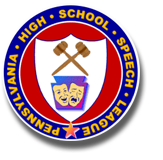On an occasion of this kind it becomes more than a moral duty to speak one’s mind. It becomes a pleasure.
Oscar Wilde
Pennsylvania High School Speech League
About
About PHSSL
Background
The Pennsylvania High School Speech League was founded in 1961. Bloomsburg University has been PHSSL's home office since July, 2016. Its overall purpose is to stimulate through educational competition an understanding and appreciation of all areas of speech. In addition, the League:
Membership
Membership is open to any public, private or parochial high school in the state. Currently, more than 150 schools are members of the League. The state is divided into 14 districts. Students compete in district tournaments which qualify them for the state competition.
Benefits
Participation in the League meets four of the Fifteen Goals of Quality Education:
- Acquire communication skills of understanding, speaking, listening, reading and writing
- Develop self-understanding and a sense of self-worth
- Develop analytical thinking skills
- Acquire knowledge, appreciation and skills in the Arts and Humanities.
Participation in the League provides opportunities for academic competition.
Participation in the League provides access to our newsletter, the Communicator, three times during the school year.
Competitive Events
-
Commentary:
A continuation of both extemporaneous and persuasive speaking. It can be both informative and advocative. Knowledge of events and some history is required. Contestants seated at a table or desk for the presentation. Preparation time: 30 minutes. Time limit: 5 minutes.
-
Cross Examination Debate
A clash of two, two-person teams, one affirmative and one negative, on the annual national policy resolution. The affirmative presents a case for change in the present system. The negative supports the present system or a counter-proposal for change.
-
Drama
Competition in drama is held at the regional and state levels. A school performs a one-act play or cutting of a longer work with more than two characters. Two schools advance from each region to the state finals. Competitions are held during the first semester.
-
Dramatic Interpretation
A contestant chooses a cutting from a serious play and memorizes it. The student recreates the scene using appropriate gestures and voices. Time limit: 10 minutes.
-
Duo Interpretation:
“Literature” is defined as a single stage, screen, television, radio play, fictional or non-fictional work or poem. All selections must be published or commercially available in print, audio, or video form. Time limit: 10 minutes.
-
Extemporaneous Speaking:
A contestant selects a topic about a current issue. Preparation time: 30 minutes. Time limit: 7 minutes.
-
Humorous Interpretation
A contestant chooses a cutting from a humorous play and memorizes it. The student recreates the scene using appropriate gestures and voices. Time limit: 10 minutes.
-
Impromptu Speaking: *
In a limited amount of time a student prepares a brief speech on topics such as proverbs, aphorisms or quotations. Preparation time: 5 minutes. Time limit: 5 minutes.
-
News Broadcasting: *
A pair of contestant present 3, three-minute news broadcasts. In subsequent rounds, prepared scripts are used.
-
Informative Speaking:
Original speeches teach or explain a concept or idea. Time limit: 7 minutes.
-
Lincoln-Douglas Debate:
A clash of two debaters, one affirmative and one negative, on a values topic. National topics change every two months.
-
Oral Interpretation of Poetry:
A contestant interprets with script in hand one or more poems. Time limit: 10 minutes.
-
Oral Interpretation of Prose:
A contestant interprets with script in hand a cutting from a short story or novel. Time limit: 10 minutes.
-
Persuasive Speaking:
Original speeches convince the audience. Time limit: 10 minutes.
-
Parliamentary Debate
A clash of two three person teams debating both prepared and impromptu topic rounds. The six students in the debate and the judge(s) form a legislative body voting on an issue of policy.
-
Public Forum Debate:
A clash of two, two person teams, one pro and one con on a contemporary resolution. National topics change every month.
-
Student Congress - Senate:
-
Student Congress - House: *
In this event students take on the roles of legislators. Using parliamentary procedure, students debate bills and resolutions on current issues.
In this event students take on the roles of legislators. Using parliamentary procedure, students debate bills and resolutions on current issues.
* - Events denoted with an asterisk are held at the state level only.
